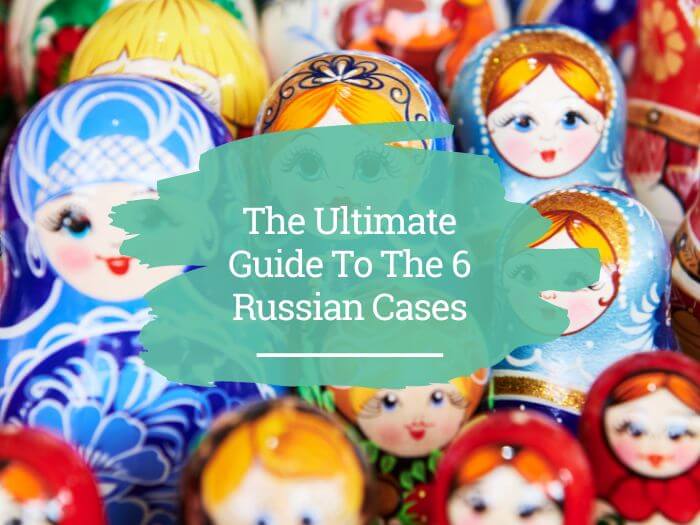When it comes to learning Russian, one of the big challenges is getting used to another grammar system.
And one of the biggest aspects of grammar to get used to is noun case. Also called grammatical case or declension, you need to be aware of Russian cases from the beginning of your Russian-learning journey.
In this post you'll learn:
- what grammatical case is
- How noun cases work in Russian
- The six Russian noun cases
- Some of the challenges of Russian cases
Keep in mind that this is an overview of Russian noun cases and that it’s meant to give you a bird’s eye view of the subject.
Because each case is such a big topic on its own, you'll find a separate article linked for each one so you learn more about the specifics and how to form it.
Otherwise, for now, let's get into this Russian cases overview.
Pro Tip
By the way, if you want to learn Russian fast and have fun, my top recommendation is Russian Uncovered which teaches you through StoryLearning®.
With Russian Uncovered you’ll use my unique StoryLearning® method to learn Russian through story… not rules. It’s as fun as it is effective. If you’re ready to get started, click here for a 7-day FREE trial.
What Are Noun Cases?

Noun cases are hard to explain if you’re not used to them. You could think of them as the endings on a noun that tell you that noun’s relationship to the other actors in a sentence.
Okay…that sounds pretty abstract. Thankfully, we have examples of noun cases in English since they used to be a huge part of the language.
Consider the following normal sentences:
- We ran into them at the cafe – CORRECT
- He told me that he is going into town – CORRECT
However, we know that a sentence would be wrong if we were to say something like
- Us ran into they at the cafe – INCORRECT
- Him told I that him is going into town – INCORRECT
As English speakers, we understand that the words “we”, “he” and “I” only work as the subjects of a sentence. And with pronouns, this system is pretty complex.
| I | he | she | we | nominative case | (subject) |
| my/mine | his | her/hers | our | genitive case | (possession) |
| me | him | her | us | accusative case | (object) |
In English, only a few words have a case. In Russian however, almost every single noun changes according to case. These changes appear at the ends of words.
While this might seem strange, just remember that English still has something akin to a case marking for possession that you use all time. The ending of ’s goes at the end of words to show ownership.
- My best friend’s wedding
- Her uncle’s girlfriend’s dog
This is similar to Russian cases as the feature comes at the end of the noun:
- стол (the table)
- на столе (on the table)
- нож (a knife)
- ножом (with a knife)
And with some practice, putting these endings on becomes as natural as adding on ‘s.
Why Russian Cases Are Important

In English, the relationship between actors and objects is defined by word order. Consider the two sentences:
- The shark chases the dolphin (actor – shark / object – dolphin)
- The dolphin chases the shark (actor – dolphin / object – shark)
In both sentences, we know who the actor is because they appear at the beginning and before the verb.
In Russian, however, word order (порядок слов) plays a different role. The baseline word order in Russian is the same as in English (actor – verb – object).
However, there is quite a lot of flexibility, especially when you want to be poetic or emphasise something.
- Иван любит Машу (Ivan loves Masha)
- (basic word order)
- Машу любит Иван (Ivan loves Masha)
- (Ivan, not someone else, loves her)
As such, understanding Russian cases is essential to speaking correctly and understanding the nuances of speech.
The Russian Noun Cases
Now let's cover each of the noun cases that you’ll find in Russian. You can read more about each case by reading the article on each specific one.
How many noun cases does Russian have?
In almost every Russian textbook, you’ll find six different cases. There are a few other partial cases, but for conversational Russian, you just need to know the six basic cases.
The Nominative Case – именительный падеж

This is considered the sort of base form of a noun, so when you look up a noun in the dictionary, you’ll find it in the nominative case. It shows you who the subject of a sentence is.
This can mean the who or what is doing a given action:
- Иван любит Машу (Ivan loves Masha)
- никто не знает все (No one knows everything)
- вода кипит (The water is boiling)
Or the subject can simply be who the focus is:
- Нож на кухне (The knife is on the table)
The other important function of the nominative case is in sentence structures like “X is Y.” This may take some getting used to since Russian almost always drops the verb “to be”.
- это мой друг (This is my friend)
- это его картины (These are his paintings)
- вот ваша книга (Here is your book)
- Лондон – столица Великобритании (London is the capital of Great Britain)
The Genitive Case – родительный падеж

This is the case that shows possession and origin. Generally speaking, if you would use either of or ’s in English, then you’ll use the genitive case in Russian.
- это книга Ивана (This is Ivan’s book)
- член группы (a member of the group)
- час завтрак (breakfast time [lit. time of breakfast])
- машина ее друга (her friend’s car [lit. car of her friend])
In English, you could say something like “This is her uncle’s friend’s dog.” In Russian, though, you more often reverse the order:
это собака подруги ее дяди
This is the dog of the friend of her uncle
(nominative) (genitive) (genitive)
The genitive is also used to show the absence of something. Namely with the preposition без (without) and the word нет (there is no).
- он ходит без обуви (He walks regularly without shoes)
- у меня нет денег (I have no money)
The Dative Case – дательный падеж

The dative case is used to mark the receiver of something. That can be an action or an object. You may have also heard this called the indirect object.
The Russian name for the case дательный means something like ‘gift case’ or ‘giving case’ because it comes up so often with verbs that mean “to give” like дать, давать, and дарить.
- Иван подарил Маше мяч (Ivan gave Masha a ball)
- lit. Ivan gave to Masha a ball
- Маша подарила Ивану бутылку (Masha gave Ivan a bottle)
- lit. Masha gifted to Ivan a bottle
If you can translate something as “give to X” then the X will most likely be in the dative case.
The dative case is also used with some verbs like звонить (to call someone), советовать (to give advice to someone), and зказать (to say to someone).
For each of them, the someone in question takes the dative case:
- Зновите клиентам (Call the client)
The other major use of the дательный падеж is with the prepositions к and по. К roughly translates as “for” or “to.”
- подключение к Интернету (connection to the Internet)
- Доступность к компонентам (access to components)
По is probably one of the hardest Russian words to translate because it has so many meanings related to how and where something happens.
The main thing you need to know now is that if you see по, then you should expect the dative case to follow.
- Мы гуляли по улице (We were walking down the street, along the street, etc)
- Говорить по скайпу (To talk through Skype, by Skype, via Skype, etc)
- Делать что-то по плану (To do something according to plan)
The Accusative Case – винительный падеж

Aside from the nominative case (subject), the accusative is the most common case you’ll see and use. It indicates the direct object, i.e. who or what is the recipient of an action.
- Иван любит Машу (Ivan loves Masha)
- Maша любит Ивана (Masha loves Ivan)
- мы покупили торт (We bought a cake)
- Он прочитал книгу (He finished reading the book)
The vast majority of verbs in Russian use the accusative case to show their actions. That means if you hear (слушать), see (видеть), do (делать), or eat (есть) anything then that something will be in the accusative.
- Я увидел его (I saw him)
- Дети ели бутерброды (The children were eating sandwiches)
Aside from indicating the direct object of an action, the accusative also shows direction. This can be an end-destination or a place that someone is moving towards, but the key-element is that there’s movement, often with a verb of motion.
- Я иду в школу (I’m walking to school)
- Он едет на завод (He’s driving to the factory)
- Я перешел через улицу (I crossed (over) the street)
The Instrumental Case – творительный падеж

The instrumental case in Russian is one of the trickier grammar points for most English speakers. Generally, it shows the means, the way, or the tool with which an action happens. Most often this is rendered in English with the word “with.”
So, it can show the instrument that an action is done with.
- Я ем палачками (I eat with chopsticks)
- Писал письмо карандашом (He wrote with a pencil)
The instrumental case also shows with whom an action is done. In other words, the company.
- Он ходит туда с Лизой (He walks there (regularly) with Liza)
- я живу там с братом (I live there with my brother)
The instrumental case is also used to show certain spatial relationships with a few specific prepositions.
| Перед | in front of, before | перед домом | in front of the house |
| Над | over, above | над водой | over the water |
| Под | under, below | под крышей | under a roof |
| Между | between | между молотом и наковальней | between the hammer and the anvil (a difficult situation) |
The Prepositional Case – Предложный падеж

This case probably has the most self-explanatory name since you find the prepositional case only after prepositions (предлоги). In fact, this case is only used after a handful of specific prepositions.
Here are the most common:
- о (about, regarding)
- на (on, in)
- в (on, in)
The most common way you’ll see and use the prepositional case is the marking of location.
- Я работаю в офисе (I work in an office)
- Мы живем в Астане (We live in Astana)
- Нож на кухне (The knife is in the kitchen)
You’ll also see the prepositional case with the preposition ‘о’ which is usually translated as “about.”
- он не сказат об этом (He’s not going to talk about it)
- она читала о системе (She was reading about the system)
You’ll also find the preposition case with the prepositions при and по.
- при свечах (by candlelight, in candle light)
- по прие́зде (on/upon arrival)

Quirks Of The Russian Cases
As you can see, Russian cases can be a bit complex at times. Many have a primary use that is expanded on in specific ways which aren’t always obvious.
Likewise, there are certain elements of the case system that new learners often find difficult. While I can’t go over all of these, I’ll cover some of the biggest ones now.
Russian Cases And Numbers

One of the first quirks of the Russian cases comes when talking about Russian numbers. You see, certain numbers take certain cases.
The reasons for this go back hundreds of years into the history of the Russian language, but all you need to know is that some numbers use the nominative case and some numbers use the genitive case.
One, two, three, four, and numbers ending in those numbers use the nominative case:
- один банан (one banana)
- два банана (two bananas)
- три банана (three bananas)
- четыре банана (four bananas)
- сорок один банан (forty-one bananas)
Five to ten and numbers ending in those same number use the genitive case:
- пять картофелин (five potatoes)
- восемь картофелин (eight potatoes)
- девять картофелин (nine potatoes)
- сорок девять картофелин (forty-nine potatoes)
This might seem strange at first, but as you dig further into Russian, you’ll start to see the logic behind it.
Russian Cases And Inanimate Objects

For the majority of nouns in Russian, the case system is straightforward. A book is книга if it’s the subject and книгу if it’s the object – вот и все (that’s it). However, as a learner, you should look out for masculine nouns in the singular.
Masculine nouns will have different case markings depending on whether or not they refer to living things. If a direct object (accusative case) is something living then it will take a different case than if it’s inanimate
Animate
- Maша любит Ивана (Masha loves Ivan)
- Я увидел ее брата (I saw her brother)
Inanimate
- мы покупили торт (We bought a cake)
- Иван подарил ему мяч (Ivan gave him a ball)
The specific ins and outs of this structure are a bit tricky at first. So, check out the articles on the genitive and accusative cases to find out more!
Russian Cases With Location And Movement

You may have noticed that some prepositions can go with multiple noun cases.
These show different meanings that can sometimes be easy to overlook. Specifically, the difference between location and movement.
When it comes to location, you might notice that a word can use either the prepositional case or the instrumental.
- в воде (in the water [prepositional case])
- над водой (above the water [instrumental case])
And when there’s movement, you’ll see the accusative case.
- В воду (into the water [accusative case])
Additionally, the preposition в is being used in two different ways with two different cases. So what’s happening?
The important distinction to make is whether something or someone is in a static ongoing location (in the water) or if the location is changing (into the water).
Static locations use the preposition and instrumental cases.
- Я был в школе (I’m at school [in the school])
- Он работает на заводе (He works at the factory [in the factory])
- кроты живут под землей (Moles live under the ground)
When you talk about a destination or change in location, then you use the accusative case.
- Я иду в школу (I’m walking to school)
- Он едет на завод (He’s driving to the factory)
- крот ушел под землю (The mole went underground [the mole wasn’t there before])
Mastering Russian Cases

All right, you’ve made it to the end, but that was a lot of information to cover!
Russian cases may seem confusing at first, but just remember people speak a language to communicate with each other, not to confuse new speakers.
There is an internal logic to it all that will be revealed as you go further and further into your Russian-learning experience.
But for now, it’s good that you understand:
- What Russian cases are
- The six major noun cases in Russian
- Some of the peculiarities of the Russian case system
Of course, one of the best ways to fully master the Russian cases is with exposure. And what better way to expose yourself to lots of Russian than with a good story?
Over time, as you read short stories in Russian, using each case will feel more natural as you get used to all the specifics and idiosyncrasies. And before long, you’ll find yourself using all six Russian cases without a second thought.
So go out there and change some noun endings! And as always Удача из удач! (Best of luck!)

Olly Richards
Creator of the StoryLearning® Method
Olly Richards is a renowned polyglot and language learning expert with over 15 years of experience teaching millions through his innovative StoryLearning® method. He is the creator of StoryLearning, one of the world's largest language learning blogs with 500,000+ monthly readers.
Olly has authored 30+ language learning books and courses, including the bestselling "Short Stories" series published by Teach Yourself.
When not developing new teaching methods, Richards practices what he preaches—he speaks 8 languages fluently and continues learning new ones through his own methodology.










































